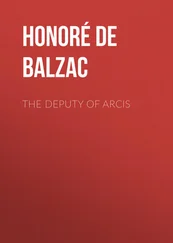“A million?” said Grandet, “why, it is a million pieces of twenty sous each, and it takes five twenty sous pieces to make five francs.”
“Dear me!” cried Eugenie, “how could my uncle possibly have had four millions? Is there any one else in France who ever had so many millions?” Pere Grandet stroked his chin, smiled, and his wen seemed to dilate. “But what will become of my cousin Charles?”
“He is going off to the West Indies by his father’s request, and he will try to make his fortune there.”
“Has he got the money to go with?”
“I shall pay for his journey as far as—yes, as far as Nantes.”
Eugenie sprang into his arms.
“Oh, father, how good you are!”
She kissed him with a warmth that almost made Grandet ashamed of himself, for his conscience galled him a little.
“Will it take much time to amass a million?” she asked.
“Look here!” said the old miser, “you know what a napoleon is? Well, it takes fifty thousand napoleons to make a million.”
“Mamma, we must say a great many neuvaines for him.”
“I was thinking so,” said Madame Grandet.
“That’s the way, always spending my money!” cried the father. “Do you think there are francs on every bush?”
At this moment a muffled cry, more distressing than all the others, echoed through the garrets and struck a chill to the hearts of Eugenie and her mother.
“Nanon, go upstairs and see that he does not kill himself,” said Grandet. “Now, then,” he added, looking at his wife and daughter, who had turned pale at his words, “no nonsense, you two! I must leave you; I have got to see about the Dutchmen who are going away to-day. And then I must find Cruchot, and talk with him about all this.”
He departed. As soon as he had shut the door Eugenie and her mother breathed more freely. Until this morning the young girl had never felt constrained in the presence of her father; but for the last few hours every moment wrought a change in her feelings and ideas.
“Mamma, how many louis are there in a cask of wine?”
“Your father sells his from a hundred to a hundred and fifty francs, sometimes two hundred,—at least, so I’ve heard say.”
“Then papa must be rich?”
“Perhaps he is. But Monsieur Cruchot told me he bought Froidfond two years ago; that may have pinched him.”
Eugenie, not being able to understand the question of her father’s fortune, stopped short in her calculations.
“He didn’t even see me, the darling!” said Nanon, coming back from her errand. “He’s stretched out like a calf on his bed and crying like the Madeleine, and that’s a blessing! What’s the matter with the poor dear young man!”
“Let us go and console him, mamma; if any one knocks, we can come down.”
Madame Grandet was helpless against the sweet persuasive tones of her daughter’s voice. Eugenie was sublime: she had become a woman. The two, with beating hearts, went up to Charles’s room. The door was open. The young man heard and saw nothing; plunged in grief, he only uttered inarticulate cries.
“How he loves his father!” said Eugenie in a low voice.
In the utterance of those words it was impossible to mistake the hopes of a heart that, unknown to itself, had suddenly become passionate. Madame Grandet cast a mother’s look upon her daughter, and then whispered in her ear,—
“Take care, you will love him!”
“Love him!” answered Eugenie. “Ah! if you did but know what my father said to Monsieur Cruchot.”
Charles turned over, and saw his aunt and cousin.
“I have lost my father, my poor father! If he had told me his secret troubles we might have worked together to repair them. My God! my poor father! I was so sure I should see him again that I think I kissed him quite coldly—”
Sobs cut short the words.
“We will pray for him,” said Madame Grandet. “Resign yourself to the will of God.”
“Cousin,” said Eugenie, “take courage! Your loss is irreparable; therefore think only of saving your honor.”
With the delicate instinct of a woman who intuitively puts her mind into all things, even at the moment when she offers consolation, Eugenie sought to cheat her cousin’s grief by turning his thoughts inward upon himself.
“My honor?” exclaimed the young man, tossing aside his hair with an impatient gesture as he sat up on his bed and crossed his arms. “Ah! that is true. My uncle said my father had failed.” He uttered a heart-rending cry, and hid his face in his hands. “Leave me, leave me, cousin! My God! my God! forgive my father, for he must have suffered sorely!”
There was something terribly attractive in the sight of this young sorrow, sincere without reasoning or afterthought. It was a virgin grief which the simple hearts of Eugenie and her mother were fitted to comprehend, and they obeyed the sign Charles made them to leave him to himself. They went downstairs in silence and took their accustomed places by the window and sewed for nearly an hour without exchanging a word. Eugenie had seen in the furtive glance that she cast about the young man’s room—that girlish glance which sees all in the twinkling of an eye—the pretty trifles of his dressing-case, his scissors, his razors embossed with gold. This gleam of luxury across her cousin’s grief only made him the more interesting to her, possibly by way of contrast. Never before had so serious an event, so dramatic a sight, touched the imaginations of these two passive beings, hitherto sunk in the stillness and calm of solitude.
“Mamma,” said Eugenie, “we must wear mourning for my uncle.”
“Your father will decide that,” answered Madame Grandet.
They relapsed into silence. Eugenie drew her stitches with a uniform motion which revealed to an observer the teeming thoughts of her meditation. The first desire of the girl’s heart was to share her cousin’s mourning.
Table of Contents
About four o’clock an abrupt knock at the door struck sharply on the heart of Madame Grandet.
“What can have happened to your father?” she said to her daughter.
Grandet entered joyously. After taking off his gloves, he rubbed his hands hard enough to take off their skin as well, if his epidermis had not been tanned and cured like Russia leather,—saving, of course, the perfume of larch-trees and incense. Presently his secret escaped him.
“Wife,” he said, without stuttering, “I’ve trapped them all! Our wine is sold! The Dutch and the Belgians have gone. I walked about the market-place in front of their inn, pretending to be doing nothing. That Belgian fellow—you know who I mean—came up to me. The owners of all the good vineyards have kept back their vintages, intending to wait; well, I didn’t hinder them. The Belgian was in despair; I saw that. In a minute the bargain was made. He takes my vintage at two hundred francs the puncheon, half down. He paid me in gold; the notes are drawn. Here are six louis for you. In three months wines will have fallen.”
These words, uttered in a quiet tone of voice, were nevertheless so bitterly sarcastic that the inhabitants of Saumur, grouped at this moment in the market-place and overwhelmed by the news of the sale Grandet had just effected, would have shuddered had they heard them. Their panic would have brought the price of wines down fifty per cent at once.
“Did you have a thousand puncheons this year, father?”
“Yes, little one.”
That term applied to his daughter was the superlative expression of the old miser’s joy.
“Then that makes two hundred thousand pieces of twenty sous each?”
“Yes, Mademoiselle Grandet.”
“Then, father, you can easily help Charles.”
Читать дальше












